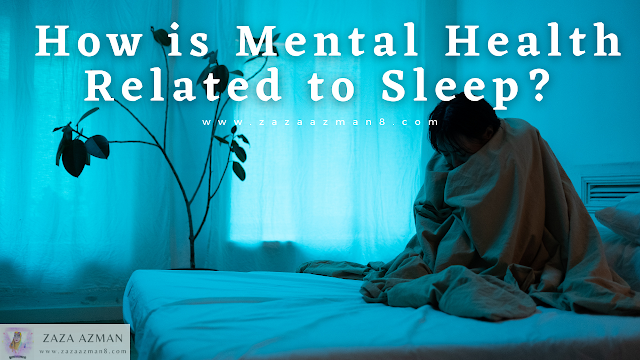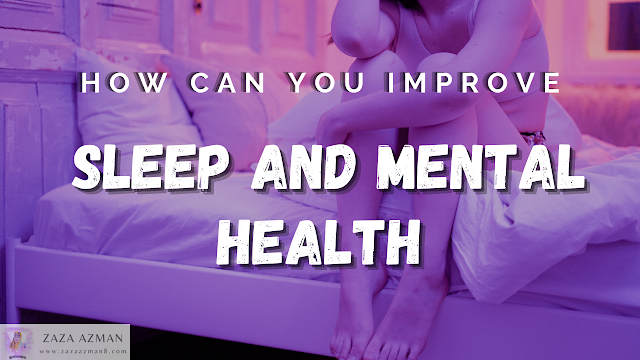Have you been having difficulties sleeping through the night? The majority of individuals are aware of how sleep impacts their mental health. As it happens, there is an amount of merit to this expression. Sleep is linked to psychological health and has been linked to depression, stress, psychiatric illness, and other disorders.
While further research on the links connecting psychological health and sleep is needed, the data so far suggests a positive correlation. Sleeping problems make it more difficult to get a good night's sleep.
Moreover, poor sleep, particularly sleeplessness, can have a role in the onset and progression of psychological problems. Sleeping and psychological health are complicated concerns influenced by a variety of variables.
However, considering their special connection, there is evidence suggesting that increasing rest can have several desirable properties and can be used to treat various neurological conditions.
How is Mental Wellbeing Related to Sleep?
| Photo URL: https://www.pexels.com/photo/woman-sleeping-935777/ |
It's not an astonishing fact that getting enough sleep is essential for a healthy quality of life. In the short to medium term, poor sleep might make you angry and exhausted, but it can also cause significant long-term psychological effects. Sleep deprivation has been related to various negative health outcomes, including cardiovascular disease, diabetes, and anxiety.
According to studies, the link between sleep quality and psychological wellbeing is complicated. Psychological disorders can cause insomnia difficulties, and sleep disruptions can worsen several psychological disorders, especially stress, panic, and chronic depression.
While sleep has long been recognized as a symptom of many psychological disorders, newer theories imply that rest can also play a causative role in the onset and persistence of various psychological issues.
Sleep issues can cause changes in mental wellbeing, while psychological issues can exacerbate sleep issues. Sleep deprivation has been linked to the emergence of some mental disorders.
However, the explanations for this remain unknown to experts. With this symbiotic link connecting sleep habits and psychological health, in-depth studies regarding the connection and rectification methods have surfaced in recent years.
There are over seventy various types of sleep problems. Insomnia, disruptive sleep apnea, different movement disorders, and paralysis are the most prevalent issues. The kind of sleep disturbance, its frequency, and its severity differ depending on the mental condition.
The connection between sleep disturbances and different mental issues, on the other hand, is so significant that experts have long hypothesized that the two categories of diseases have physiological foundations. Let’s explore how mental health issues can cause issues with sleep.
Depression
According to studies employing various techniques and demographics, around 90% of adult patients with severe depression and around 90% of children with the same condition have sleep issues. The majority of people with depression suffer from sleeplessness, but one in every five also has obstructive sleep apnea.Sleeplessness and other sleep disorders also raise the risk of depression. Insomnia and other sleep disorders have an impact on the results of depressed individuals.
According to surveys, depressed individuals who continue to have sleeplessness cannot engage with therapy than those who do not have sleep issues.
Bipolar and Manic Episodes
According to studies in various demographics, throughout a psychotic state of bipolar illness, 69% to 99% of individuals experience sleeplessness or have a reduced desire for sleep.According to research, 23% to 78% of bipolar sufferers sleep heavily, whereas others have sleeplessness or sleep disturbances.
In addition, insomnia and other sleep difficulties continue to deteriorate before a manic or depressive episode, and sleep deprivation can cause psychosis. Sleep issues also hurt emotions and lead to relapsing.
Attention Deficit Hyperactivity Disorder (ADHD)
Approximately half of the children with ADHD have sleep difficulties of some kind. Decreased sleep quality and disturbed sleep are all common issues. It might be difficult for doctors to easily distinguish between the ADHD symptoms and sleeping problems since they overlap.Up to 25% of patients have sleep-disordered respiration, and up to 36% have restless legs syndrome, disturbing sleep. Even if they do not match the clinical definition for ADHD, individuals with these sleeping problems might become overactive, distracted, and mentally disturbed.
How Can You Improve Sleep and Mental Health?
Steps to enhance sleep might even be part of a mental health prevention plan. Here are some proven options to help you with improving sleep and mental health.
Cognitive Behavioral Therapy (CBT)
Cognitive-behavioural therapy (CBT) is a kind of psychotherapy that looks at mental states and attempts to reframe unwanted beliefs in new ways.Several forms of CBT have been created for particular disorders, including depression, stress, and mood disorders. Furthermore, CBT for sleeplessness can assist people in sleeping better.
Better Sleeping Habits and Patterns
Meditation methods, for example, can be used as part of a regular night ritual to help you unwind. Finally, dim the lights and set aside gadgets before sleeping.
These can help with establishing good sleeping patterns and boosting mental health simultaneously.
And for my fellow Muslim brothers and sister, I've found a way to help cope with mental health through an app named Mindful Muslim that's created by an amazing person named Mr Mohd Akhtaar, He aims to support Muslims all over the world who are facing mental illnesses such as stress, anxiety and depression. Read all about it in my other blog entry.

The excellent thing is that, while sleep issues are frequently cited as modifiable issues for various illnesses, figuring out how to increase the quality of sleep might help alleviate the symptoms of various mental illnesses.
This isn't to say that getting extra rest is a panacea or a speedy remedy, but it may be an essential component of a well-rounded therapy strategy.
While additional study is required to analyze more about the efficacy of these therapies, there has been some indication that therapies that focus on improving sleep help alleviate certain mental health issues.
Bottom Line

The excellent thing is that, while sleep issues are frequently cited as modifiable issues for various illnesses, figuring out how to increase the quality of sleep might help alleviate the symptoms of various mental illnesses.
This isn't to say that getting extra rest is a panacea or a speedy remedy, but it may be an essential component of a well-rounded therapy strategy.
While additional study is required to analyze more about the efficacy of these therapies, there has been some indication that therapies that focus on improving sleep help alleviate certain mental health issues.

You can find more information on https://puffy.com/blogs/wellness/sleep-calculator-want-to-know-the-best-time-to-sleep-wake-up for tips and tricks on enjoying better sleep patterns.
You can also use the sleep calculator to find out how many hours you need to rest to boost your cognitive functions and stay away from mental health disorders in the long run.
Isn't that convenient? Now you can monitor yourself to a healthier way of living with a more adequate sleeping guide. I hope you all can find your peace of mind while having a good night rest.
Take care and stay healthy 💪💜
Well, that's all for now! Thanks for reading my blog !! I hope you've enjoyed it!
Have a wonderful day and always be happy!!
THANKS FOR BEING A PART OF MY READERS 💕🥰
Love and rise up,
DON'T FORGET TO LIKE, SHARE, COMMENT AND SUBSCRIBE / FOLLOW 👍
Be nice, Be respectful and Be responsible.
Zazasters a.k.a MamaMonsta👻
#Mentalhealth #mentalhealthfighter #anxiety #depression #postpartum #posttraumaticdisorder #hangingbyathread
#lifestyleblogger #zazaazman8com #enjoylife #appreciatelife #preciousmoments #zazablogjourney #contentwriter #MYMindfulMuslim
Original photo was taken from Google Images and Photo Credit to its owner. Edited version by Me.











0 Comments
Post a Comment
Be Nice, Be Respectful and Be Responsible. No Negative Vibes. Any Rude or Vile comments will be reported accordingly. Thank You :)
Spread Love . Stop Hatred. Live Life To The Fullest.